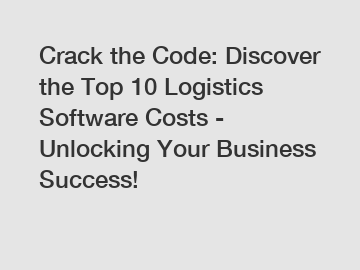Crack the Code: Discover the Top 10 Logistics Software Costs - Unlocking Your Business Success!
Crack the Code: Discover the Top 10 Logistics Software Costs - Unlocking Your Business Success!
Have you ever wondered what factors contribute to the costs of logistics software? In this article, we will uncover the top 10 logistics software costs that businesses should be aware of. By understanding these costs, you can make informed decisions to optimize your logistics operations and unlock your business success.
1. Licensing Fees.

One of the primary costs associated with logistics software is the licensing fee. This fee is typically charged on a per-user basis or as a flat fee, depending on the software provider. Licensing fees vary depending on the features and functionalities of the software, as well as the number of users who will be accessing it. It is important to carefully evaluate your business needs and compare pricing options to ensure you are getting the best value for your money.
2. Implementation and Training.
Implementing new logistics software requires initial setup and configuration, as well as training for your staff. These implementation and training costs can vary depending on the complexity of the software and the level of customization required. It is crucial to allocate resources for proper training to maximize the benefits of the software and minimize any downtime during the transition period.
3. Customization and Integration.
In some cases, businesses may require customizations or integrations with their existing systems to fully optimize the logistics software. Customization and integration costs can be significant, as they involve programming and development work. It is essential to carefully assess your business requirements and consider the potential long-term benefits before investing in customizations or integrations.
4. Maintenance and Support.
Ongoing maintenance and support are necessary to ensure that your logistics software continues to function smoothly. Software providers may charge a recurring fee for maintenance and support services. This cost is crucial to consider, as it ensures that any glitches or issues can be promptly addressed, minimizing downtime and maximizing operational efficiency.
5. Upgrades and Updates.
Technology is always evolving, and logistics software providers frequently release upgrades and updates to enhance the software's functionality and security. Upgrades and updates may come at an additional cost, either as a one-time fee or a recurring charge. Staying up-to-date with the latest versions of the software is essential to take advantage of new features and ensure your logistics operations remain competitive.
6. Data Security and Privacy.
As logistics software involves handling sensitive business and customer data, ensuring robust data security and privacy measures is crucial. Investing in advanced security features and regular security audits might result in additional costs. However, the potential risks of data breaches and unauthorized access far outweigh the initial investment.
7. Scalability.
Scalability is an essential factor to consider when selecting logistics software. As your business grows, your software should be able to handle increased volumes and accommodate additional users. While many software providers offer scalable solutions, it is important to understand the associated costs of scaling up your software to ensure it aligns with your business growth plans.
8. User Support.
Effective user support is vital to address any questions or issues that may arise while using the logistics software. Some providers may offer free customer support, while others may charge for premium support packages. Consider your business needs and the level of support required when evaluating different software options.
9. Integration with Third-Party Services.
Logistics operations often involve collaboration with third-party service providers, such as carriers and suppliers. Integration with these external systems may incur additional costs, as it requires developing interfaces and establishing connections. However, seamless integration can streamline your operations and improve collaboration, making it well worth the investment.
10. Return on Investment (ROI).
Finally, it is crucial to evaluate the potential return on investment of the logistics software. Assessing the impact on operational efficiency, cost savings, and customer satisfaction will help determine the true value of the software. While it is essential to consider the upfront costs, focusing on the long-term benefits and ROI is key to unlocking your business success.
In conclusion, logistics software costs encompass various factors such as licensing fees, implementation and training, customization and integration, maintenance and support, upgrades and updates, data security and privacy, scalability, user support, integration with third-party services, and return on investment. Understanding these costs and carefully evaluating different software options will empower you to make informed decisions, optimize your logistics operations, and unlock your business success.
For more information, please visit effective small parcel shipping software, Parcel distribution software dashboard, SaaS basis 4pl logistics companies software.
162
0
0

Comments
All Comments (0)